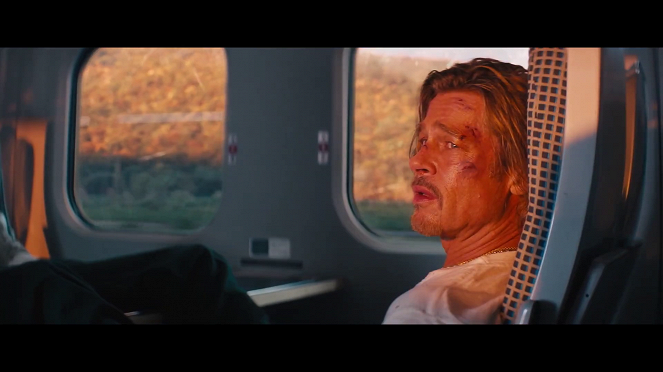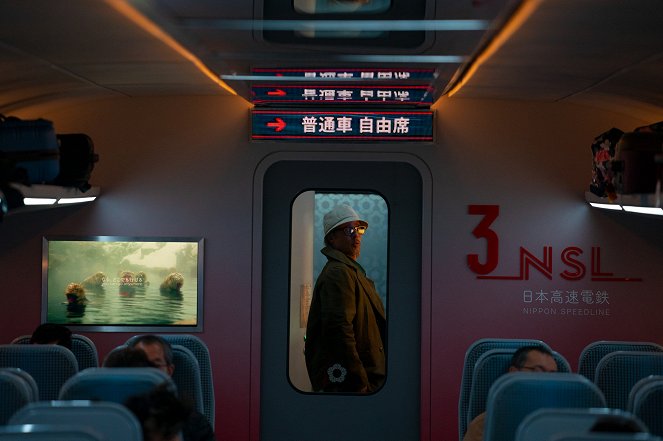Directed by:
David LeitchScreenplay:
Zak OlkewiczCinematography:
Jonathan SelaComposer:
Dominic LewisCast:
Brad Pitt, Joey King, Aaron Taylor-Johnson, Brian Tyree Henry, Andrew Koji, Hiroyuki Sanada, Michael Shannon, Bad Bunny, Sandra Bullock, Zazie Beetz (more)VOD (5)
Plots(1)
Unlucky assassin Ladybug (Brad Pitt) wants to do things peacefully after a run of bad luck and takes a job retrieving a briefcase on a bullet train in Japan. After snatching the briefcase, he discovers that there are multiple other assassins on board the train, all with connected but conflicting missions. (Sony Pictures Home Entertainment)
Videos (4)
Reviews (16)
I expected a wild and exhilarating ride, but the result is even more frenetic in the cadence of ideas than my boldest imaginations. Whoever says that there is a lack of action must have confused platforms and boarded a train towards Stará Paka. In this Shinkansen, beloved narrative sources and styles alternate, where Kill Bill shakes hands with the more successful work of Guy Ritchie, while insane twists intertwine with absurd bloody splatters reminiscent of the old undertakings by Joel and Ethan Coen. In the end, at several points, I almost raised my hands to applaud with enthusiasm, as certain moments evoked a great euphoria in me thanks to a perfectly fitting cameo or the perfectly fitting soundtrack. The highest rating didn't come at first simply because it is a mix of genres that relies more on inspirations and quotations than on its own contribution, but it doesn't detract from the entertainment value at all, quite the opposite.
()
Rather than Tarantino, this is closer to a shabby Ritchie, unfortunately after a slight lobotomy. Too bad about the dumb explanation at the end, too bad about the repetitive dialogues between Tangerine and Lemon, which often weren't actually very funny, even though they tried to be very cool. Ritchie wouldn’t make those mistakes. But, given the director's name, you shouldn’t expect a new John Wick, the full-contact fights don't have that much juice and idea, and I could certainly do without the overdone conclusion with the shinkansen, where I just expected Tom and Jerry to come out of somewhere and start hitting each other with frying pans. But otherwise, the story was brilliantly conceived, it had a surprising twist, it all made sense by the end, and some of the scenes were so incredibly absurd and absurdly plotted that they were actually fine. Interesting postmodernism, which I wouldn't expect from a former stuntman. Of the actors, Aaron Taylor-Johnson shone the brightest, he's walking masculinity with acting talent.
()
Bullet Train is a good action flick without much ambition, where the disparate cast of peculiar characters have fun and Brad Pitt in particular pulls it off well with his "substitute". Just the reveal of both the main villain and his motivations was like something out of a movie, like, three quality levels down. It's a bit too cluttered and unfocused at times with the exuberant wannabe cool style and numerous flashbacks, but that was probably the intention, and what the hell, it's entertaining anyway.
()
Bullet Train can be criticised for a lot of things, but it can also be enjoyed for the same reasons. Here we have Japan literally on a high-speed train together with a furious pace and non-linear narrative that rather serves to divert the viewer’s attention and mask the screenplay’s shortcomings, as well as the simulation of depth and reach typical of the source material’s author, Kōtarō Isaka. Unlike Japanese adaptations of Isaka’s novels, here the motifs of interconnectedness, luck and fate do not evoke wonder and pathos, but are ground down into superficially entertaining attractions. Bullet Train also works with Tarantino-esque characters, i.e. absolutely unrealistic genre characters that stand out due to their exaggeration, stylishness and grounding in pop culture. Based on the described principle, Tarantino and some of his disciples create sophisticated, powerful and seemingly well-thought-out gangsters and killers that, in the best case, transcend the level of the wet dream of fictional perfection and become semi-divine ideals that viewers admire. In Bullet Train, however, they just remain unrealistic, amusing puppets with one cartoonishly exaggerated and endlessly repeated attribute. Then we have the action scenes, or rather their choreography, which was at the forefront in previous 87North (or 87Eleven) productions, drawing attention to itself through spectacular physicality, difficulty of execution and revolutionary ingenuity. This time, the action is rather in the background, always primarily in the form of slapstick gags connecting the individual plot sequences. Whatever overarching term we use for the film’s described tendencies – bastardisation, anti-sophistication, dumbing-down, assimilation or Hollywoodisation – this is what gives Bullet Train its charm and effectiveness. The film absorbed into itself every possible trend of previous years and even decades that had been valued by overly clever fans, cinephiles and devotees of alternative niches, and strained them through the mainstream filter to create a universally accessible form. It will inevitably be derided by the elites because it is not like the perfect forms that they appreciate, but it will make Bullet Train a popular box-office hit. After Fast & Furious Presents: Hobbs & Shaw, Leitch’s subsequent project evokes the middle-of-the-road works of Hong Kong cinema’s golden era, which comprised chaotically disparate variety shows blending together a multitude of emotions and genre positions, and where the audience’s attention was constantly drawn to various attractions, including action escapades and cameo appearances by popular stars. If we recall that David Leitch and his contemporaries are great admirers of Hong Kong movies, it’s possible to see this not as a coincidence, but as a concept.
()
Overblown, epileptic postmodernism, or when the director of the most imaginative American action films of the last decade takes on a script that he wants to make into something more than action. The mix of Ritchie, Tarantino and Japanese culture can be seen at every turn, but it works at about half speed.
()



Ads